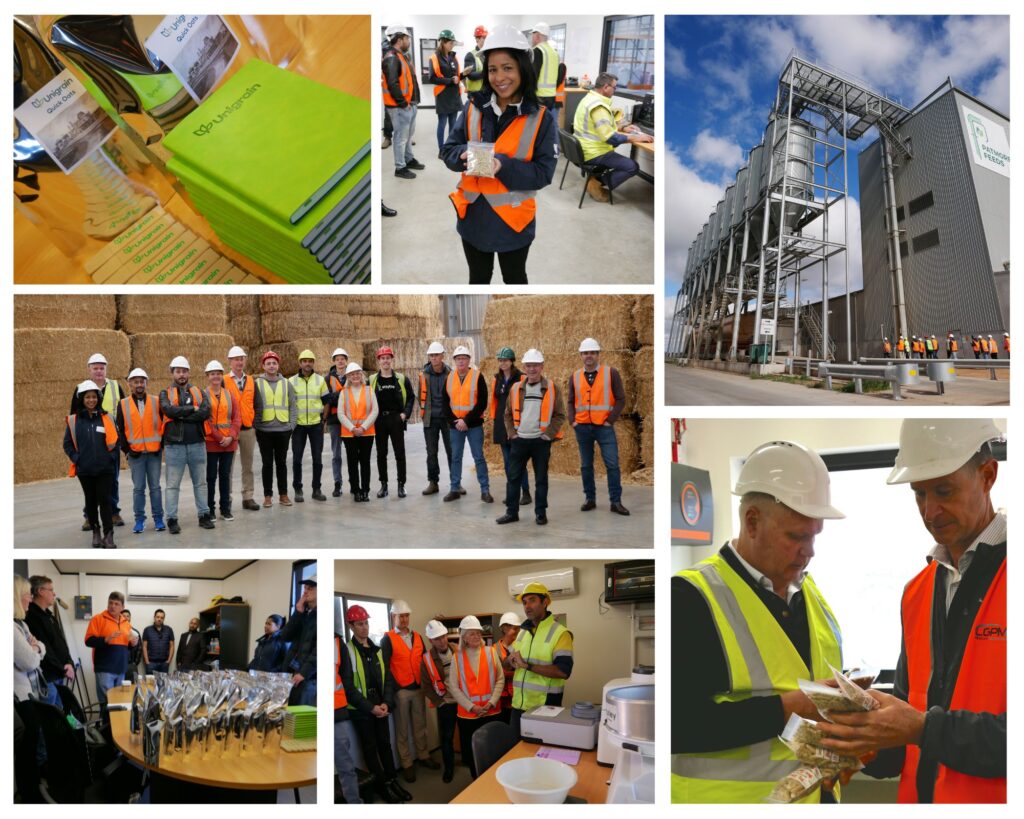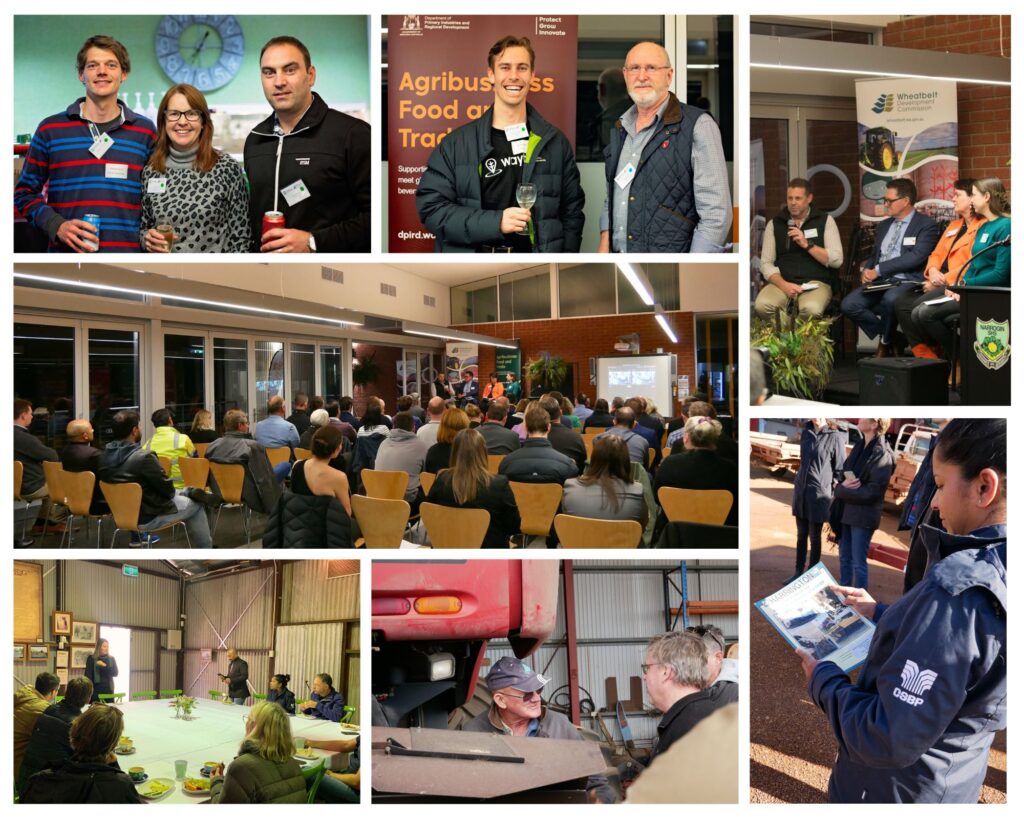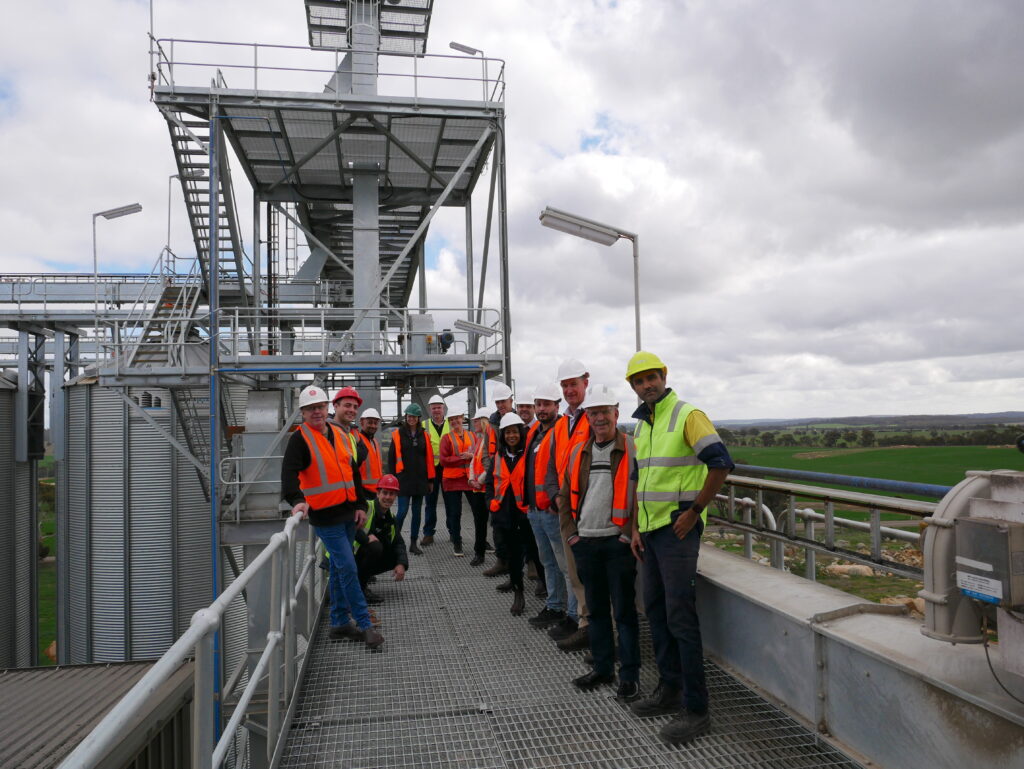It was a busy two days for the AgriStart HARVEST cohort who journeyed throughout the Wheatbelt South sub-region with site visits at and between Brookton, Cuballing, Narrogin, Wagin and Williams.
The Field Trip has been part of the HARVEST program since its inception in 2018 with the key focus showing these technology startups, mostly from Perth, the potential of the agriculture market and connect them to farmers and producers to better understand grower decision making. It also provides an opportunity for the cohort to explore the innovative solutions, sustainable practices, and transformative ideas shaping the future of agriculture.
After a picturesque bus drive through the rolling green pastures of the southern wheatbelt, most dotted with new lambs, we arrived at Patmore’s Feeds, a new large feed processing facility, perched on a hilltop near Cuballing.
An Ambitious Vision Realised: Patmore’s Feeds
Patmore Feeds started as a vision from farmers to help satisfy the unmet demand for quality ruminant livestock feed for sheep and cattle. The initial idea to place a somewhat modest sized mill, grew into what is now a significant multi-million-dollar investment delivering one of the largest pelletised ruminant feed mills in WA suppling the Wheatbelt and Great Southern.
At full capacity, the mill can produce 180 000 tonnes of feed per year, and with production commencing in mid 2022 is already meeting high demand producing 2500 tonnes per week. Patmore’s Feeds remains locally and privately owned by farmers and associates.
It is supported by one of Australia’s highly regarded nutritionist with months long trialling helping to improve the integrity of the pellets, and identify supplements to improve nutritional benefits for animals and even methane reduction.
“The Innovation is in the nutrition that goes into the pellets. The pellets are now seen as a tool you can use to manage a number of different scenarios throughout the year, rather than just when it dries off. There are benefits to improve specific outcomes for your livestock such as pregnancy.”
Paul Avery, Director, Patmores Feeds

Thank you to Paul and Jaffer for giving us an exclusive all access tour of this state of the art facility from intake for testing, Control Room then high up into the multiple levels of the mill. The cohort had many questions for them both and it was great to see discussion around collaborative possibilities including biochar in feed and health monitoring in trials.
Sustainable renewable energy production benefiting Narrogin and the world
Once settled into their accommodation, the cohort were given an fascinating presentation from Director of Future Energy Australia, Andrew Rogers, regarding their proposal to construct and operate a biorefinery processing plant in Narrogin to produce a renewable biodiesel.
The proposal includes a biorefinery plant, a feedstock receival area, woodchip drying beds, and supporting infrastructures. The biorefinery plant will utilize waste lignocellulose biomass as feedstock which will undergo pyrolysis followed by non-catalytic distillation process to produce a biodiesel and the by-products wood vinegar and biochar.
The plant will operate 24 hours per day, 7 days per week to produce 18.8 million litres per annum (MLpa) of biodiesel, 7,424 tonnes per annum (tpa) of biochar and 6.173 MLpa of wood vinegar.
Further questions from the cohort revealed fuel distribution, the possibility of renewable fuel concessions, EPA and development applications, suitable biomass sources. Also discussed were opportunities for farmers to offset their carbon footprint from farming activities.
Locally Grown, Globally Focused 2023
Later that evening the cohort attended an event hosted by the Wheatbelt Development Commission (WDC) and Department of Primary Industries & Regional Development (DPIRD) where regional leaders and innovators gathered at Narrogin Senior High School’s Hill Top Café.
Acting WDC CEO Susan Hall explained the Locally Grown, Globally Focused event seeks to highlight the collective strength of the Wheatbelt region’s businesses, and the opportunities that are emerging due to a range of global drivers and the comparative advantages of this region. The event also celebrates the small business development made possible through the RED grants and Value Add Investment grants, which has supported 51 businesses with over $4.8 million in the last 5 years.
Also mentioned was DPIRD’s long and continued support of AgriStart through the HARVEST program where agribusiness startups are brought to the Wheatbelt and connected to their target markets.
The HARVEST cohort were able to connect with DPIRD staff including Heather Brayford, Director General; Cecilia McConnell, Deputy Director General, and Paul Isaachsen, Deputy Director General, Industry and Economic Development.
Keynote speaker Andrew May Co-CEO Unigrain spoke of embracing the opportunities of an emerging global plant protein market and why they have chosen to invest in the Wheatbelt South.
Innovation Cluster Managing Director Tash Teakle facilitated a panel discussion with Andrew Rogers , Ash Wiese from Three Farmers Foods, and Maree Gooch from CRISP Wireless . Hailing from the fields of AgTech, Biofuels Development, Value Adding Agriculture and Digital Connectivity the exceptional panel speakers, all exemplars of innovation and entrepreneurship, shared their business stories, how they are responding to drivers to propel prosperity in regional WA and the housing and labour challenges in the region.
Value-add food processing facility meeting global demand
The next day the cohort travelled out to Wagin to visit Unigrain, one of Australia’s leading producers of plant based food and beverage ingredients, specialising in oat cereal, pulse based and animal nutrition products. The WA facility processes oats for export into asia, inclusing China, India, Taiwan, Japan.
The Wagin facility purchases about 2000 tonnes of milling grade raw oats from WA farmers per week with around 1200 tonnes of processed oats produced per week.
It was interesting to hear about the challenges of organic oats markets and the use of the term regenerative farming. The process is receiving raw oats from growers arrive on site, grade allocated, stored in bunkers, cleaned, dehulled, with the resulting green groat being processed in kilns with steam, radiators to dry, and to deactivate lipase enzymes to increase shelf life stability. No fortifying, or additives and the husks sold or used to burn in husk boiler to heat water to generate steam to use in processor. There is a press on site to make pellets with other byproducts.
Co-CEO Andrew May spoke about the future opportunities for circular economy with Three Farmers delivering oats, which are then processed for the end market, with left over hulls to Future Energy in Narrogin for biofuel, with that fuel used by mill, and byproduct biochar used by Three Farmers to fertilise crops. Thank you to Brett and Andrew May from Unigrain for their time showing the cohort the facility.
History of innovation
A bus drive (and a detour later!) we arrived into Corderling to visit innovator and entrepreneur Ray Harrington at one of his prime lamb and crop farms Morlup Downs, part of a 3500 ha enterprise. Ray spoke about 55 years of innovation in both the sheep and grain production systems, his journey developing his innovations, partnering with universities, and intellectual property challenges. Thank you to Ray for his time, wise advice and generosity sharing his stories.
Williams Woolshed – adapting to thrive
Thank you to Williams Woolshed for their warmth, hospitality and delicious lunch for the cohort’s last stop in the Wheatbelt. Williams Woolshed is a thriving retail and hospitality business which has capitalises on the significant tourist traffic passing through their small community.
The multi faceted business is owned and operated by two dedicated local families who are passionate about the town of Williams and its sustained success and future growth opportunities.
They strive to create greater opportunities for their community. Owner Sara Duff gave a short presentation on how the business has cleverly and bravely adapted in response to significant challenges and is an example of the resourcefulness and problem solving abilities of regional communities. Sara spoke about successful outcomes for innovative businesses in Williams and revealed their exciting plans of expansion of branches of the business into other regional centres.
“AgriStart's HARVEST Wheatbelt trip has been a highlight of the 2023 Program. Over two days, we have connected with leading industry stakeholders and engaged face to face for insightful discussion on innovations, learnings, and opportunities within the WA Agricultural sector. If you are a startup looking to innovate in the Agrifood and Agtech space then get this on your to do list for 2024.”
Dean Phillips, Xsights Chief Sales & Marketing Officer

“I experienced the value of the program; its ability to inspire, provide insight and learnings, plus facilitate collaboration across industries. It was a thrilling introduction to the ag world for a newbie like myself. I was proud to see CSBP Fertilisers support innovation authentically, playing a central role in cultivating opportunities to nurture and grow the industry. Meeting many incredible, passionate regional leaders and innovators over two days was exciting. But what made it special was that the cohort was diverse, with different ages, backgrounds and wide-ranging professional experiences. It was a talented, skilled group of WA-based passionate innovators from Esperance and Kojonup to those with roots from Bhutan, Algeria and Holland. ”
Eva Quilty, Community Engagement Advisor, HARVEST sponsor CSBP

